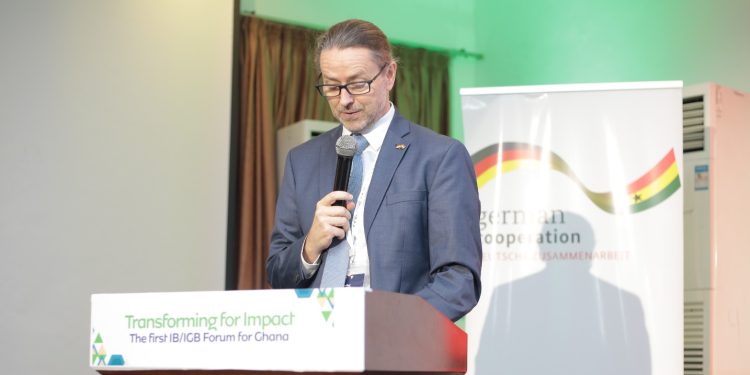
The Deutsche Gesellschaft für Internationale Zusammenarbeit (GIZ) GmbH, in collaboration with the Association of Ghana Industries (AGI) and the Ghana Enterprises Agency (GEA), successfully hosted Ghana’s first Inclusive Business and Inclusive Green Business (IB/IGB) Forum on October 22, 2024, in Accra.
Funded by the German Cooperation through GIZ’s Support to the Private and Financial Sector Programme, this milestone event marks a critical step in promoting sustainable business models that address economic, social, and environmental challenges in Ghana.
The IB/IGB landscape study, which culminated in this event, screened more than 300 companies and identified 15 companies that fulfill the criteria of inclusive and inclusive green business.
More than 1,8 million low-income population are being reached by this companies and directly contribute to a better livelihood. The study aims to foster commercially viable business lines that not only enhance income and living standards for low-income groups but also tackle environmental challenges through scalable and innovative solutions.
Over the course of the study, more than 200 stakeholders were engaged, including government agencies, impact investors, and business associations, contributing vital insights and feedback to shape the study’s findings and recommendations.
Key Highlights and Strategic Impact
The IB/IGB Forum served as a platform for uniting these stakeholders to align on the study’s findings and discuss strategies for implementation.
The event focused on building institutional ownership and refining a national strategy to support the development of inclusive business and green economy growth in Ghana.
Dr. Dirk Assmann, GIZ Ghana Country Director, emphasized during the forum: “this initiative is not just about identifying innovative business models but about creating a sustainable framework that empowers communities, enhances livelihoods, and protects the environment. The commitment we’re seeing from key partners and the enthusiasm of businesses to adopt these models is inspiringith.”
The forum achieved several critical objectives:
Confirming Commitment: Major stakeholders from the public and private sectors, including business associations, government officials, and development partners, confirmed their support for the strategic recommendations.
Innovative Financing Solutions: Presentations and discussions highlighted innovative financing mechanisms that reduce risks for businesses adopting IB/IGB models, particularly through social innovation. The initiative is developing a Risk Reduction and Social Innovation Fund in order to facilitate better access to finance for such businesses and link them with impact investors who exactly look for companies with social and environmental impact.
Women’s Empowerment: The study projects that by 2026, over 40% of businesses engaged in IB/IGB initiatives will be women-led.
Knowledge Exchange: The event facilitated discussions on the Impact-Driven Return Business Coaching and Mentoring (IDR-BCM) programme, which has already provided technical assistance to 35 companies, equipping them with tools to scale inclusive business practices.
Looking Forward: The Road to Implementation
The Ghana IB/IGB Forum also introduced the first in a series of three seminars on the Impact Drives Return – Business Coaching and Mentoring (IDR-BCM) programme, providing companies with the opportunity to engage with consultants and facilitators on how to adopt and scale IB/IGB business models.
The seminars aim to accelerate the implementation of these innovative strategies across various sectors.
By bringing together key players from both the public and private sectors, the Ghana IB/IGB Forum has laid the foundation for a collaborative and inclusive approach to economic growth.
This forum is not just an event—it is the launch of a sustained effort to support the transformation of the way businesses operate in Ghana, ensuring that social inclusion and environmental sustainability are central to future growth and therefore contributes to a just transition to a more inclusive, green and sustainable economy.
As the IB/IGB initiative progresses, GIZ, in partnership with GEA and AGI, will continue to work with stakeholders to develop the institutional framework and actionable steps required to drive inclusive and green business strategies forward, ensuring long-term success and sustainability for Ghana’s economy.
About GIZ
As a provider of international cooperation services for sustainable development and international education work, GIZ is dedicated to building a future worth living around the world.
GIZ has over 50 years of experience in a wide variety of areas, including economic development and employment, energy and the environment, and peace and security.
GIZ works with businesses, civil society actors, and research institutions, fostering successful interaction between development policy and other policy fields and areas of activity.
The German Federal Ministry for Economic Cooperation and Development (BMZ) is our main commissioning party.
Currently, GIZ promotes sustainable development in Ghana via about 50 programmes and projects.
The activities currently cover three priority areas: Energy and Climate, with a concentration on renewable energy and energy efficiency; Training and Sustainable Growth for Decent Jobs, and Peaceful and Inclusive Societies, which looks at good governance.
Disclaimer: Ahotoronline.com is not liable for any damages resulting from the use of this information
Norvanreports




